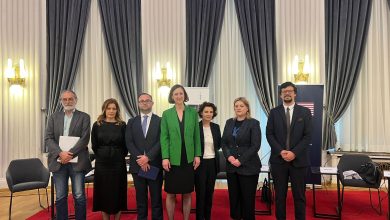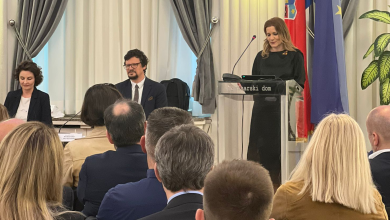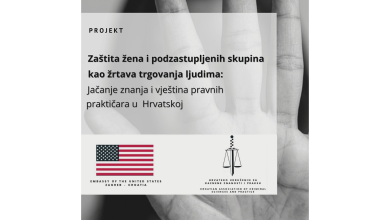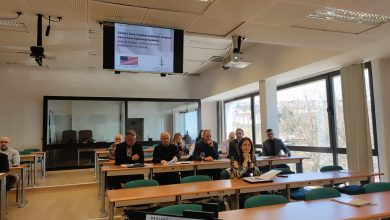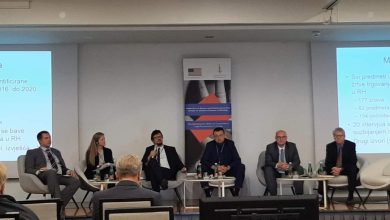Summary of the Implemented Project Activites
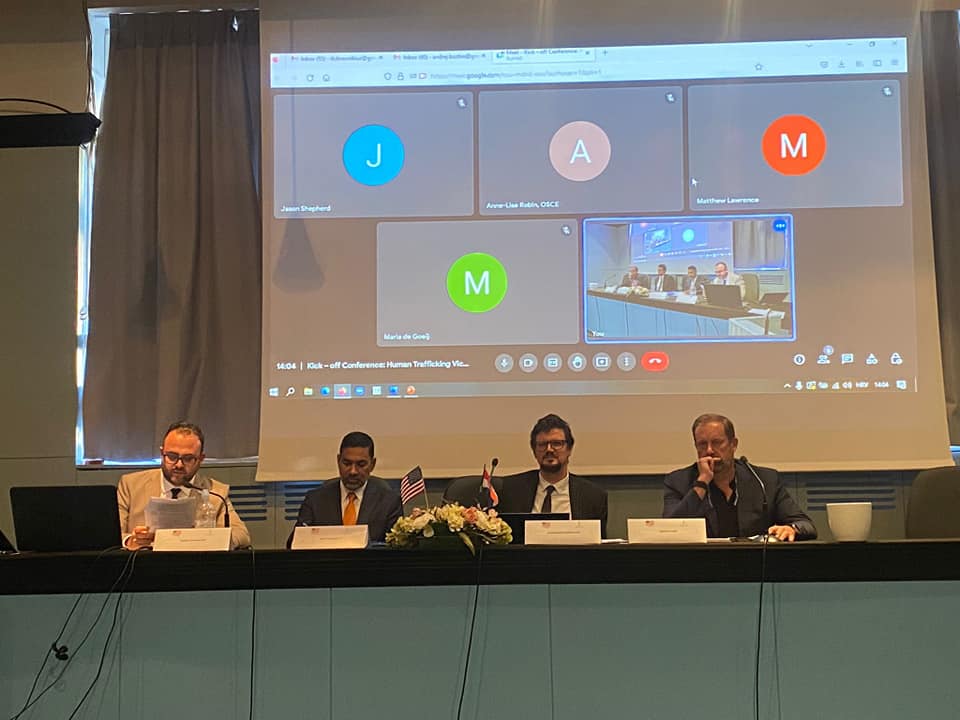
Activity 1.
The Kick-off Conference on the “Protection of Women and Underrepresented Groups as Victims of Human Trafficking: Strengthening the Skills and Capacities of Legal Practitioners in Croatia” was successfully held on 9th November 2022 at the Inter-university Center in Dubrovnik, Croatia. The conference began with welcoming remarks by the moderator, Andrej Bozhinovski, Assistant Project Coordinator, and Doctoral Assistant at the Department for Criminal Law, Faculty of Law Zagreb. This was followed by opening statements from Assist. Prof. Aleksandar Marshavelski, Project Coordinator and Assistant Professor at the Faculty of Law, University of Zagreb, and Ameet Kabrawala, Regional Resident Legal Advisor, U.S. Department of Justice, Embassy of the United States of America in the Republic of Croatia. The conference featured three panels, each focusing on different aspects related to ensuring victims’ testimony in court without victimization and compensation for victims. Panel 1, moderated by Andrej Bozhinovski, included presentations from T. Markus Funk, Partner at Perkins Coie LLP and Former Chicago Federal Prosecutor, who discussed survivor-centered identification of THB victims and preparing their in-court testimony from a U.S. perspective. Hon. Virginia M. Kendall, Judge at the U.S. District Court in Chicago, presented on “The Trauma Informed Courtroom – the Judge’s Role.” Jason Shepherd, Senior Director International Strategy at Thomson Reuters Special Services, shared insights on human trafficking and forced labor from a digital viewpoint. Following a brief coffee break, Panel 2 featured an online presentation by Anne-Lise Robin, Program Officer at the OSCE Office of the Special Representative and Coordinator for Combating Trafficking in Human Beings. T. Markus Funk, Partner at Perkins Coie LLP, along with Dastid Pallaska, Lawyer in Prishtina, Republic of Kosovo, discussed challenges faced by NGOs in the global anti-trafficking arena. The final panel, moderated by Assist. Prof. Aleksandar Marshavelski, included presentations by Prof. Damir Primorac, Lawyer and Professor at the Faculty of Law, University of Split and University of Mostar; Judge Kornelija Ivanusic, Judge at the Basic Court of Velika Gorica; and Kristinka Rezek, representing the Office for Human Rights and Rights of National Minorities of the Government of the Republic of Croatia. They shared practical experiences from Croatia in ensuring victims’ testimony in court, avoiding victimization, and providing compensation. The conference concluded with a final discussion and the promulgation of conclusions, led by Assist. Prof. Aleksandar Marshavelski and Andrej Bozhinovski. The Kick-off Conference provided a valuable platform for knowledge exchange, highlighting experiences from the U.S., international perspectives, and Croatian practical experiences. The event served as an important step towards strengthening the skills and capacities of legal practitioners in Croatia to effectively address human trafficking and protect the rights of victims.
Recommendations:
Strengthen Interdisciplinary Cooperation: Foster closer collaboration and information sharing among law enforcement agencies, judiciary, social services, NGOs, and other relevant stakeholders involved in combating human trafficking. Establish clear channels of communication and coordination to ensure a comprehensive and coordinated approach to victim identification.
Provide Comprehensive Training: Develop and implement comprehensive training programs for professionals involved in the identification process, including law enforcement officers, judges, prosecutors, and social workers. The training should focus on recognizing indicators of trafficking, understanding the specific vulnerabilities of different victim groups, and employing trauma-informed approaches to engage with victims.
Raise Awareness: Launch public awareness campaigns to educate communities and potential victims about the nature of human trafficking, its warning signs, and available support services. Engage the media, educational institutions, and community organizations to disseminate accurate information and promote a collective effort against trafficking.
Ensure Victim-Centered Approaches: Prioritize victim safety, well-being, and rights throughout the identification process. Implement victim-centered approaches that prioritize the informed consent, confidentiality, and non-revictimization of victims. Provide appropriate support services, including medical, psychological, and legal assistance, to empower victims in their journey towards recovery.
Enhance Data Collection and Analysis: Establish standardized protocols for data collection and analysis related to THB cases. This will facilitate the systematic gathering of information on victim profiles, trafficking patterns, and successful identification strategies. Regularly evaluate and share data to identify trends, inform policy development, and improve victim identification practices.
Activity 2.
The project team convened an Online Consultation Meeting for stakeholders with the objective of facilitating discussions on supporting and enhancing the learning strategy, curriculum, and the development of moot cases for practitioners. The meeting served as a platform for stakeholders to come together and explore effective approaches to strengthen the learning process, curriculum design, and the creation of practical scenarios for practitioners to enhance their understanding and skills in combating human trafficking.[1]
Activity 3.
Osijek. The Workshop on Human Trafficking and Victim Testimony took place on 15th December 2022 at the Faculty of Law, University of J.J. Strossmayer in Osijek. The event aimed to shed light on current practices and international standards related to human trafficking and to explore the topic of victims’ testimony in court without victimization and victim compensation. The workshop brought together key stakeholders, experts, and practitioners in the field to exchange knowledge and discuss strategies to address these critical issues. The event commenced with insightful introduction speeches by Prof. Ph.D. Tunjica Petrašević, Dean of the Faculty of Law, University of J.J. Strossmayer in Osijek, Prof. Ph.D. Ante Novokmet, Vice Dean of the Faculty of Law, and Assoc. prof. Ph.D. Aleksandar Maršavelski, Project Manager from the Faculty of Law, University of Zagreb. The presence of Ms. Erica S. King, Deputy Public Affairs Officer from the Embassy of the United States of America in the Republic of Croatia, added further significance to the event. Panel 1 focused on the current practices and international standards related to human trafficking and slavery. Under the guidance of Assoc. prof. Ph.D. Barbara Herceg Pakšić, Faculty of Law, University of J.J. Strossmayer in Osijek, Tomislav Ramljak from the Center for Missing and Abused Children in Osijek delivered a thought-provoking presentation on human trafficking in the context of sexual exploitation of children in cyberspace. Following a refreshing coffee break, Panel 2 delved into the topic of victims’ testimony in court without victimization and victim compensation. Assoc. prof. Ph.D. Barbara Herceg Pakšić moderated the session, which featured Iva Barić Milojković from the County Court in Osijek, who shared insights from the victim and witness support department. Additionally, Andrej Bozhinovski mag. iur., Project Coordinator from the Faculty of Law, University of Zagreb, provided valuable perspectives on the subject. The workshop culminated in a case analysis and final discussion, facilitated by Assoc. prof. Ph.D. Aleksandar Maršavelski, Project Manager from the Faculty of Law, University of Zagreb, and Andrej Bozhinovski mag. iur., Deputy Project Coordinator from the same institution. This session provided an opportunity for participants to reflect on the topics discussed throughout the workshop and to engage in in-depth discussions to further enhance their understanding and knowledge. Furthermore, it is worth noting that the project team established a partnership with the Center for Missing and Abused Children, Osijek, headed by Mr. Tomislav Ramljak. This collaboration added significant value to the workshop, leveraging the expertise and experience of the Center in addressing human trafficking and supporting victims.
Recommendations:
Strengthen collaboration and cooperation among relevant stakeholders, including law enforcement agencies, judiciary, civil society organizations, and international partners, to combat human trafficking effectively.
Enhance the support and assistance provided to victims and witnesses, ensuring their well-being and minimizing re-victimization throughout the legal process.
Develop comprehensive training programs and educational initiatives to equip practitioners with the necessary skills and knowledge to handle human trafficking cases and support victims effectively.
Foster international cooperation and knowledge sharing to learn from positive practices and experiences in combating human trafficking, thereby enhancing strategies and interventions.
Advocate for the implementation of policies and legal frameworks that protect the rights of victims, provide adequate compensation, and ensure their access to justice..[2]
Opatija. The panel on “Protecting Women and Underrepresented Groups as Victims of Human Trafficking” was a significant highlight of the annual criminal law conference organized by the Croatian Association for Criminal Sciences and Practice in Opatija. Attended by 250 participants, including the Minister of Justice, the panel shed light on crucial issues surrounding human trafficking and aimed to explore strategies for better protecting women and underrepresented groups who fall victim to this heinous crime. The panel featured esteemed speakers who shared their expertise and insights on various aspects related to human trafficking and its impact on vulnerable populations. Kristen E. Loehr, Political and Economic Affairs Officer from the Embassy of the United States of America in the Republic of Croatia, commenced the session with an introductory speech, highlighting the importance of addressing human trafficking and emphasizing the need for collaborative efforts in combating this issue. Next, Associate Professor Dr. Aleksandar Maršavelski from the Faculty of Law, University of Zagreb, presented empirical indicators of efforts to combat human trafficking in Croatia. His presentation provided valuable insights into the current situation in the country and offered an assessment of the progress made in curbing this form of criminal activity. The panel concluded with a thought-provoking presentation by Tomislav Brđanović, President of the Criminal Division of the County Court in Varaždin. Mr. Brđanović shared his expertise and experiences in handling cases related to human trafficking, shedding light on the challenges faced by the judiciary in prosecuting offenders and protecting victims. The Minister of Justice, whose attendance added immense significance to the panel, delivered a keynote address, emphasizing the government’s commitment to combating human trafficking and ensuring the protection of women and underrepresented groups. Their presence and involvement underscored the importance of addressing this pressing issue at the highest level of decision-making.
Croatian Bar Association (Hrvatska odvjetnička komora) supported the Alumni project’s activities by recording an e-learning program – an e-workshop was recorded titled “Trafficking in Human Beings: Protecting Women and Underrepresented Groups as Victims of Human Trafficking”. The program was promoted by the Lawyers’ Academy (Odvjetnička akademija) which was successfully completed by a total of 26 Croatian attorneys i.e. members of the Croatian Bar Association. The e-learning program is permanently available on the Croatian Bar Association’s website so that more individuals are expected to attend the workshop online. As e-learning programs at the Croatian Bar Association are typically led by one lecturer, Prof. Aleksandar Marsavelski prepared the presentation and delivered the lecture within the scope of the e-workshop.
Split. The workshop on the “Protection of Women and Underrepresented Groups as Human Trafficking Victims” was successfully held at the Faculty of Law University in Split on the 16th of February 2022. The aim of the workshop was to enhance the skills and knowledge of legal practitioners in Croatia in effectively addressing and combatting human trafficking, with a specific focus on protecting women and underrepresented groups. The first panel of the workshop, titled “Human Trafficking and Slavery: Current Practice and International Standards,” was moderated by Associate Professor Lucija Sokanović Ph.D. from the Faculty of Law University of Split. The panel featured a presentation by Mr. Ameet Kabrawala, Resident Legal Advisor at the Embassy of the United States of America in Croatia, who spoke about the American Judicial Practice of Criminal Prosecution in Child Trafficking Cases.
Following a brief coffee break, the workshop continued with the second panel on “Victims’ Testimony in Court without Victimization and Victim Compensation.” Associate Professor Lucija Sokanović Ph.D. moderated this session, and the panel included contributions from Ms. Tamara Čatlak Cindro, representing the Victims Assistance Office at the County Court in Split, and Mr. Andrej Bozhinovski mag. iur., Project Coordinator from the Faculty of Law at the University of Zagreb.
The workshop concluded with a moot case analysis and discussion session, which was also moderated by Associate Professor Lucija Sokanović Ph.D. The panel of experts participating in the session included Associate Professor Damir Primorac Ph.D., a lawyer and full-time professor at the Faculty of Law in Mostar and assistant professor at the University Department for Forensic Sciences in Split, Assistant Professor Ivana Stipanović Ph.D., an assistant professor at the Faculty of Law, University of Split, Assoc. prof. Aleksandar Maršavelski Ph.D., the Project Manager from the Faculty of Law, University of Zagreb, and Andrej Bozhinovski mag. iur., the Deputy Project Coordinator from the Faculty of Law, University of Zagreb. The workshop successfully achieved its objective of fostering the skills and knowledge of legal practitioners in Croatia to better protect women and underrepresented groups as victims of human trafficking. The discussions and presentations provided valuable insights into current practices, international standards, victim testimony, and legal strategies in addressing this pressing issue. The event served as a platform for sharing experiences and exchanging ideas, contributing to the overall efforts in combating human trafficking and promoting the rights and well-being of victims in Croatia.
Rijeka. The workshop on “Protection of Women and Underrepresented Groups as Victims of Human Trafficking” was successfully conducted at the Faculty of Law University of Zagreb on the 6th of April 2023. The objective of the workshop was to enhance the knowledge and skills of legal practitioners in Croatia to effectively address the challenges faced by victims of human trafficking, with a specific focus on women and underrepresented groups. The workshop began with welcoming remarks from Prof. dr. sc. Vesna Crnić-Grotić, the Dean of the Faculty of Law in Rijeka, and Assoc. Prof. Aleksandar Maršavelski Ph.D., the Project Leader. These introductory speeches set the stage for the discussions that followed, emphasizing the importance of combating human trafficking and protecting the rights of victims. Panel 1, titled “US Child Trafficking Prosecution Practices in the US,” was moderated by Assoc. Prof. Igor Martinović from the Faculty of Law in Rijeka. The panel featured a presentation by Ameet Kabrawala, Resident Legal Advisor at the U.S. Embassy in Croatia (To be Determined), who shared insights into the practices and approaches employed in the United States to prosecute child trafficking cases. After a refreshing coffee break, Panel 2 focused on “Testimonies of Victims of Human Trafficking in Court.” The panel was moderated by Iva Parenta Ph.D. from the Faculty of Law, University of Rijeka. Sandra Lipovac from the Rijeka County Court’s Victim and Witness Support Department provided valuable insights into the challenges faced by victims when giving testimonies in court. Panel 3 delved into the topic of “Property Claim and Compensation for Victims of Human Trafficking.” The session was moderated by Andrej Božinovski mag. iur., the Project Coordinator from the Faculty of Law in Zagreb. Martina Maršić, a judge from the Municipal Court in Rijeka, shared her expertise on the legal aspects of property claims and compensation available to victims of human trafficking. The workshop concluded with a Moot Case Analysis session, moderated by Assoc. Prof. Aleksandar Marsavelski Ph.D. and Andrej Bozhinovski from the Faculty of Law, University of Zagreb. The discussion panel engaged in a fruitful exchange of ideas and analysis of a simulated case related to human trafficking. In the final remarks, the importance of the workshop in enhancing the knowledge and skills of legal practitioners in addressing the complex issues surrounding human trafficking and protecting the rights of victims was highlighted. The workshop served as a platform for sharing experiences, discussing best practices, and fostering collaboration among legal professionals working in this field.
Activity 4.
The project team, together with a domestic trainer and a U.S. expert, has successfully drafted comprehensive Guidelines on combating human trafficking and protecting Women, Children, Roma, and Migrant Victims for justice professionals. These Guidelines align with the project’s goals and aim to enhance the effectiveness of anti-trafficking measures. The Guidelines cover various topics, providing practical guidance to justice professionals on victim identification, victim-centered approaches, legal frameworks, investigation techniques, victim support, and stakeholder cooperation. They promote consistency, effectiveness, and targeted interventions in combating human trafficking. The completed Guidelines represent a significant milestone and will be disseminated widely among justice professionals, government agencies, and civil society organizations. Training programs and workshops will be conducted to facilitate their implementation. In addition to the Guidelines for legal practitioners, the project produced one article presented at the Conference in Opatija and one brochure distributed at workshops and conferences.
Activity 5.
Final Conference. The project team organized one-day final conference in Zagreb at the House of Journalism for 95 participants to present the results of the project. The conference on the protection of women and underrepresented groups as victims of human trafficking was successfully held with an aim to strengthen the knowledge and skills of legal practitioners in Croatia. The agenda encompassed informative sessions, discussions, and analysis of simulated trial cases, fostering a comprehensive understanding of the challenges and recommendations in combating human trafficking. The conference commenced with registration and a warm welcome accompanied by coffee and cakes. The opening speeches were delivered by distinguished individuals, including:
Assoc. Prof. Ph.D. Aleksandar Maršavelski, the project manager from the Faculty of Law in Zagreb,
Amy Lillis, Chief of Political and Economic Affairs, Embassy of the United States of America in the Republic of Croatia,
Aleksa Đokić, Head of Service, Office for Human Rights and Rights of National Minorities of the Government of the Republic of Croatia,
Assoc. Ph.D. Irena Petrijevčanin, State Secretary, Ministry of Internal Affairs of the Republic of Croatia,
Dr. sc. Ivan Malenica, Minister of Justice and Administration of the Republic of Croatia,
Anja Šimpraga, Vice President of the Government of the Republic of Croatia for Social Activities and Human Rights.
Following the opening session, the workshop commenced with the first part focusing on the challenges and recommendations in combating trafficking. Andrej Božinovski, M.Sc. iur, project coordinator from the Faculty of Law in Zagreb, moderated the session, which included presentations by: Radu Cucos, Head of the Human Trafficking Program of the Organization for Security and Cooperation in Europe (OSCE), Gordana Križanić, Deputy Chief State Attorney, State Attorney’s Office of the Republic of Croatia (DORH), Nikica Hamer Vidmar, Head of the Victim and Witness Support Service of the Ministry of Justice and Administration of the Republic of Croatia. In the second part, an analysis of a simulated trial case was conducted, allowing participants to engage in an interactive examination of practical scenarios. The conference concluded with a closing session moderated by Assoc. Prof. Dr. sc. Aleksandar Maršavelski and Andrej Božinovski. A fruitful discussion took place, and important conclusions were drawn. This conference provided a platform for knowledge exchange, collaboration, and the development of effective strategies to combat human trafficking. The insights gained from the conference will contribute to further advancements in protecting the rights of women, children, members of national minorities, and migrants affected by this heinous crime. The organizers expressed gratitude to all the participants, presenters, moderators, and contributors for their valuable input and commitment to combating human trafficking. The conference concluded with a lunch, fostering networking opportunities and continued discussions among the attendees.
Online Conference. The Croatian Association for Criminal Sciences and Practice, in partnership with the US Embassy in Zagreb, successfully organized an online conference on June 29, 2023. The conference, part of the Alumni Small Grant project, focused on the critical topic of “Protection of Women and Underrepresented Groups as Victims of Human Trafficking – Strengthening the Knowledge and Skills of Legal Practitioners in Croatia.” The conference aimed to foster discussions on the legal and institutional frameworks, both domestic and international, for combatting human trafficking. It delved into the current situation, challenges faced, and strategies to prevent further victimization while ensuring appropriate compensation for victims of human trafficking. The discussions were tailored to address the specific needs of each case, adopting a multidimensional and flexible approach. The goal was to establish a clear balance between the fundamental principles of the Croatian legal system and the rights of individuals who should be recognized primarily as victims, rather than perpetrators. During the conference, a new manual containing recommendations for combatting human trafficking in the Republic of Croatia was presented, providing practical guidelines for prosecutors and judges. Esteemed participants were actively encouraged to engage in discussions and contribute their expertise to this crucial topic. The organizers welcomed attendees to share the invitation with colleagues who may have a vested interest in this subject matter.
